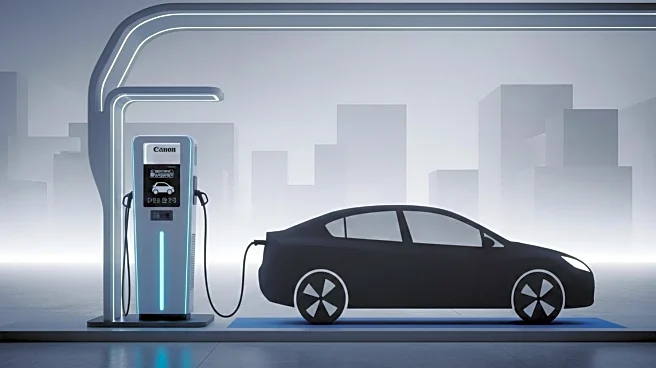What's Happening?
The Society of Motor Manufacturers and Traders (SMMT) has reported a significant increase in the UK new car market, with registrations rising by 13.7% in September to 312,891 units. This marks the strongest performance for the 'new numberplate' month since September 2020. The growth was driven by all market sectors, with fleet volumes increasing by 16.9%, private consumer demand up by 8.9%, and business registrations rising by 28.6%. Notably, more than half of all new vehicles registered were electrified, with plug-in hybrids and battery electric vehicles (BEVs) showing substantial growth. BEVs accounted for 23.3% of the market, marking the best month on record for BEV volumes.
Why It's Important?
The increase in electric vehicle registrations is a positive indicator for the automotive industry's shift towards sustainable transportation. This growth supports the UK's net zero goals by reducing carbon emissions from the transportation sector. The rise in BEV registrations, driven by manufacturer discounts and the Electric Car Grant, highlights the increasing consumer acceptance of electric vehicles. However, the gap between current EV uptake and government targets remains a challenge. Encouraging private buyers to switch to zero-emission vehicles is crucial for meeting these targets and achieving environmental goals.
What's Next?
To sustain and grow demand for electric vehicles, further efforts are needed to address barriers such as affordability and infrastructure. The Electric Car Grant plays a role in making EVs more accessible, but additional measures, such as unlocking infrastructure investment and reducing energy costs, are essential. These steps will help boost consumer confidence and drive up volumes across the sector, contributing to the UK's environmental objectives.
Beyond the Headlines
The shift towards electrified vehicles represents a broader transformation in the automotive industry, with significant investments in technology and infrastructure. This transition not only impacts manufacturers but also influences energy policies, urban planning, and consumer behavior. As the industry evolves, it will be important to monitor the long-term effects on employment, supply chains, and global competitiveness.










